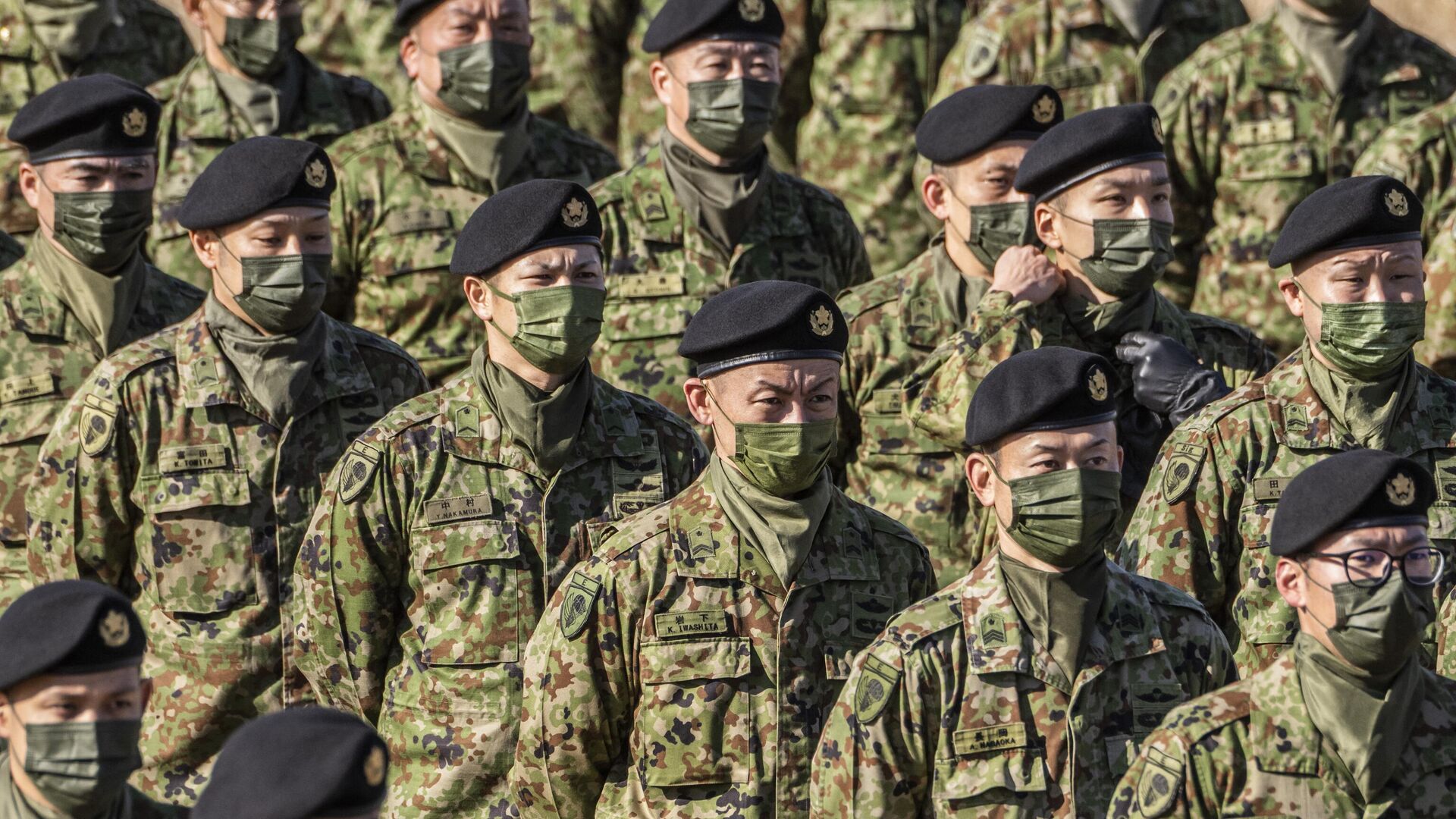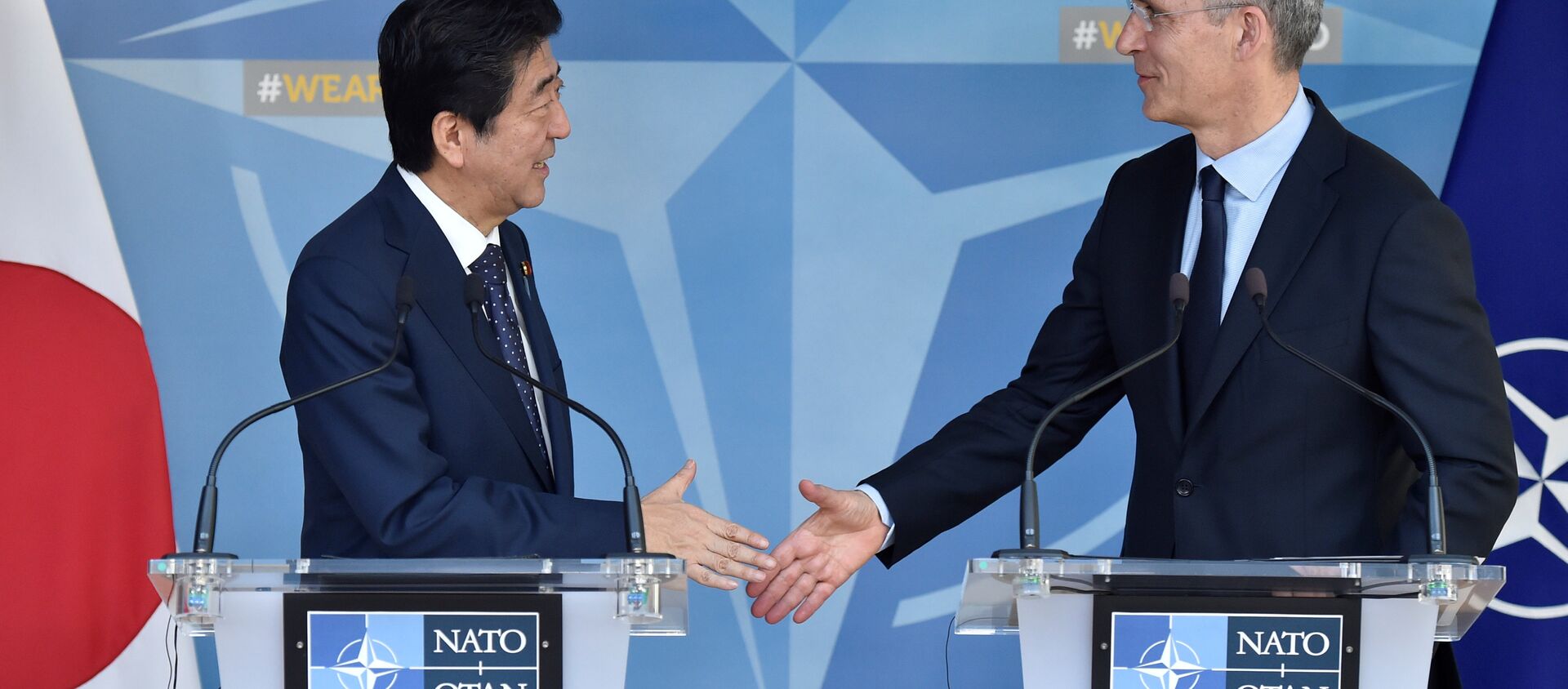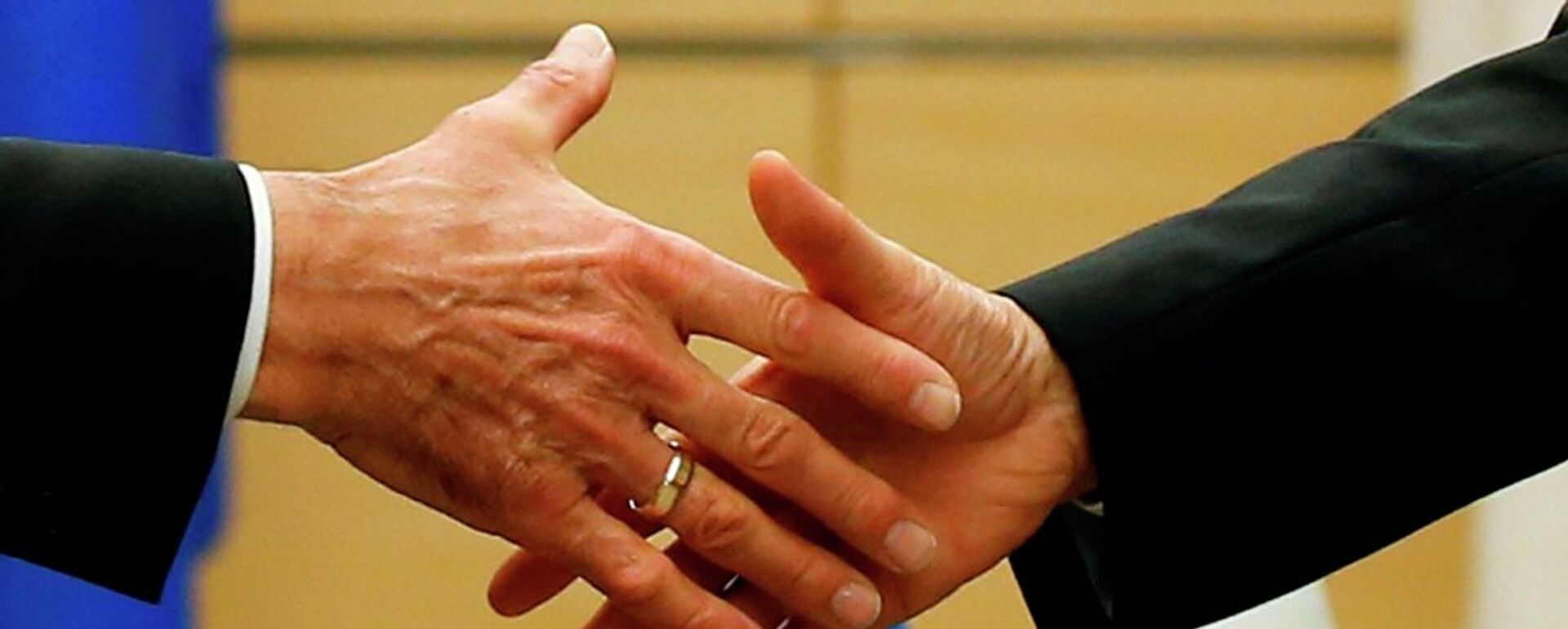https://sputnikglobe.com/20230407/is-japan-plunging-ever-deeper-into-nato-1109200370.html
Is Japan Plunging Ever Deeper Into NATO?
Is Japan Plunging Ever Deeper Into NATO?
Sputnik International
Japanese Foreign Minister Yoshimasa Hayashi is convinced that it is time for his country to deepen its cooperation with NATO. At the same time, Tokyo is determined to take the lead in maintaining and strengthening the free and open international order.
2023-04-07T04:15+0000
2023-04-07T04:15+0000
2023-04-07T04:15+0000
asia
japan
nato
militarization
https://cdn1.img.sputnikglobe.com/img/07e7/04/06/1109214671_0:0:3072:1728_1920x0_80_0_0_70054393758b71165627fcf39b7aa0bc.jpg
Sputnik discussed with experts how such statements and its increasing militarization amid prospects of joining and becoming a full-fledged participant in NATO's strategy to militarily confront China in Asia fit in with Japan's pacifist constitution.According to Andrei Fesyun, an expert in Japanese studies at the Russian Higher School of Economics, Japan is not an independent country that makes or presents new proposals and initiatives in the international arena without the approval of the United States:“This is especially evident at this time when Japan is led by Prime Minister Kishida, who is a completely pro-American figure. Therefore, Japan is now declaring what Washington and NATO need at the moment. A few decades ago, the US had the idea of creating a separate, so-called Far East NATO. A group of allied countries under the aegis of the Western military alliance and the US would focus on the European continent, and their interaction would be aimed exclusively at Russia. At the same time, the White House had plans to create a separate Far East NATO aimed exclusively against China. Meanwhile, at the moment there are no sharp differences between Russia and China. Today, their leaders meet and, even without concluding a military or political alliance, declare that their views and goals about what is happening in the world largely coincide. That is why NATO's earlier plan to divide the military bloc into two parts is no longer relevant to today's realities. And the statement of the head of the Japanese Foreign Ministry reflects the current main goal of the United States - to create a so-called ‘anaconda loop’ around Russia and China. According to their strategy, this suffocating noose should consist of a chain of countries in Asia, ready at any moment to attack or conduct military operations against China and Russia.”Earlier it was expressed in the tightening of the ring of NATO military bases and command centers only around Russia, allowing the rapid transfer of tank units and air strike groups of the Western military alliance to its European borders.Today, NATO is ready to implement this plan in Asia for the containment and, if necessary, military neutralization of China.This is precisely why the Western military alliance needs Japan, according to military analyst Igor Korotchenko, editor-in-chief of National Defense magazine and director of the Center for Analysis of World Arms Trade:“To create a nexus between NATO's global mission and its new military formats in the region, such as AUKUS. And not only with the help of Japan, but also with the help of South Korea and the inclusion of India, which would essentially constitute a NATO in the Far East. This, of course, affects the security issues of China, against which it will be primarily oriented. From a geopolitical point of view, the main inspirer of this combination is Washington, and Japan is only the executor. NATO Secretary General Stoltenberg recently visited the Asian region on this mission, visiting Tokyo and Seoul. And the agreements that were discussed with him behind closed doors are now being implemented by Tokyo in the form of statements on the international stage. Earlier, Prime Minister Kishida also initiated a series of doctrinal documents that expand the country's ability to project military power. First and foremost is the development of such destabilizing weapons as cruise missiles with a range of up to 1,500 km. Accordingly, as part of these changes, Japan will no longer have a Self-Defense Force, but a full-fledged armed force with increased size and strike capability.”In the future, Japan may also apply to join the club of nuclear powers. The country's technological potential allows it to create nuclear weapons in a very short time, and the carriers will already be deployed in the country, believes Igor Korotchenko."China, of course, is extremely negative about this. Beijing is well aware that all the initiatives put forward today by the US, Japan and NATO are anti-Chinese in nature. They are aimed at deterring China in its desire to extend its influence to Australia. AUKUS was created as a counterbalance with the establishment of a nuclear submarine fleet. And the main goal is to create a new military bloc so that, among other things, China will not be able to carry out an operation to take control of Taiwan. The Chinese leader marked the readiness of the Chinese army for this by 2027. And the current actions taken by the US and its allies are Washington's response to disrupting these plans," the expert added.Korotchenko believes that it would also help to impose a new format of arms race on China and slow down its further economic development.Fesyun, for his part, believes that the words of Japan's chief diplomat that security in Europe and the Indo-Pacific region can no longer be discussed separately deserve special attention in this context.Japan and NATO are currently developing the Individually Tailored Partnership Program. And through this program, Japan intends to significantly strengthen its cooperation with NATO in many new areas.Meanwhile, Japan has never fought anywhere since 1945, despite having a technically well-equipped army. This raises the question: "Will tomorrow's Japanese military be willing to die for goals that are not Japanese but American?" the expert concluded.
https://sputnikglobe.com/20230404/japan-sets-up-permanent-diplomatic-mission-to-nato-1109127308.html
https://sputnikglobe.com/20170707/japan-nato-expand-security-cooperation-1055311231.html
https://sputnikglobe.com/20150714/1024605456.html
japan
Sputnik International
feedback@sputniknews.com
+74956456601
MIA „Rossiya Segodnya“
2023
Sputnik International
feedback@sputniknews.com
+74956456601
MIA „Rossiya Segodnya“
News
en_EN
Sputnik International
feedback@sputniknews.com
+74956456601
MIA „Rossiya Segodnya“
Sputnik International
feedback@sputniknews.com
+74956456601
MIA „Rossiya Segodnya“
japan, nato, militarization
japan, nato, militarization
Is Japan Plunging Ever Deeper Into NATO?
Japanese Foreign Minister Yoshimasa Hayashi is convinced that it is time for his country to deepen its cooperation with NATO. At the same time, Tokyo is determined to take the lead in maintaining and strengthening the free and open international order.
Sputnik discussed with experts how such statements and its increasing militarization amid prospects of joining and becoming a full-fledged participant in NATO's strategy to militarily
confront China in Asia fit in with Japan's pacifist constitution.
According to Andrei Fesyun, an expert in Japanese studies at the Russian Higher School of Economics, Japan is not an independent country that makes or presents new proposals and initiatives in the international arena without the approval of the United States:
“This is especially evident at this time when Japan is led by Prime Minister Kishida, who is a completely pro-American figure. Therefore, Japan is now declaring what Washington and NATO need at the moment. A few decades ago, the US had the idea of creating a separate, so-called Far East NATO. A group of allied countries under the aegis of the Western military alliance and the US would focus on the European continent, and their interaction would be aimed exclusively at Russia. At the same time, the White House had plans to create a separate Far East NATO aimed exclusively against China. Meanwhile, at the moment there are no sharp differences between Russia and China. Today, their leaders meet and, even without concluding a military or political alliance, declare that their views and goals about what is happening in the world largely coincide. That is why NATO's earlier plan to divide the military bloc into two parts is no longer relevant to today's realities. And the statement of the head of the Japanese Foreign Ministry reflects the current main goal of the United States - to create a so-called ‘anaconda loop’ around Russia and China. According to their strategy, this suffocating noose should consist of a chain of countries in Asia, ready at any moment to attack or conduct military operations against China and Russia.”
Earlier it was expressed in the tightening of the ring of NATO military bases and command centers only around Russia, allowing the rapid transfer of tank units and air strike groups of the Western military alliance to its European borders.
Today, NATO is
ready to implement this plan in Asia for the containment and, if necessary, military neutralization of China.
This is precisely why the Western military alliance needs Japan, according to military analyst Igor Korotchenko, editor-in-chief of National Defense magazine and director of the Center for Analysis of World Arms Trade:
“To create a nexus between NATO's global mission and its new military formats in the region, such as AUKUS. And not only with the help of Japan, but also with the help of South Korea and the inclusion of India, which would essentially constitute a NATO in the Far East. This, of course, affects the security issues of China, against which it will be primarily oriented. From a geopolitical point of view, the main inspirer of this combination is Washington, and Japan is only the executor. NATO Secretary General Stoltenberg recently visited the Asian region on this mission,
visiting Tokyo and Seoul. And the agreements that were discussed with him behind closed doors are now being implemented by Tokyo in the form of statements on the international stage. Earlier, Prime Minister Kishida also initiated a series of doctrinal documents that expand the country's ability to project military power. First and foremost is the development of such destabilizing weapons as cruise missiles with a range of up to 1,500 km. Accordingly, as part of these changes, Japan will no longer have a Self-Defense Force, but a full-fledged armed force with increased size and strike capability.”
In the future, Japan may also apply to join the club of nuclear powers. The country's technological potential allows it to create nuclear weapons in a very short time, and the carriers will already be deployed in the country, believes Igor Korotchenko.
"China, of course, is extremely negative about this. Beijing is well aware that all the initiatives put forward today by the US, Japan and NATO are anti-Chinese in nature. They are aimed at deterring China in its desire to extend its influence to Australia. AUKUS was created as a counterbalance with the establishment of a nuclear submarine fleet. And the main goal is to create a new military bloc so that, among other things, China will not be able to carry out an operation to take control of Taiwan. The Chinese leader marked the readiness of the Chinese army for this by 2027. And the current actions taken by the US and its allies are Washington's response to disrupting these plans," the expert added.
Korotchenko believes that it would also help to impose a new format of arms race on China and slow down its further economic development.
Fesyun, for his part, believes that the words of Japan's chief diplomat that security in Europe and the Indo-Pacific region can no longer be discussed separately deserve special attention in this context.
"Japan is ready to participate more and more actively in NATO's strategy, which is moving ever closer to the creation of a global NATO. Although Japan has previously stated that it would permanently renounce war as a means of settling international disputes, while avoiding joining any military alliances. And at the moment, without changing the constitution itself, Tokyo is commenting on its individual provisions in a way that allows it to pursue a policy of militarization of the country. For example, the concept of defense has been expanded to include the right of pre-emptive counterstrike, which supposedly does not constitute military action. Meanwhile, the Tomahawk missiles purchased by Japan from the United States are not defensive but offensive weapons," the expert noted.
Japan and NATO are currently developing the Individually Tailored Partnership Program. And through this program, Japan intends to significantly strengthen its cooperation with NATO in many new areas.
Meanwhile, Japan has never fought anywhere since 1945, despite having a technically well-equipped army. This raises the question: "Will tomorrow's Japanese military be willing to die for goals that are not Japanese but American?" the expert concluded.





